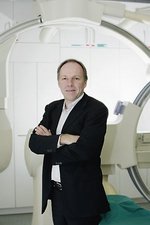
Medicine
The Medical Faculty based on the Essen campus offers a broad range of interdisciplinary basic research and clinical research in a total of 27 clinics and 20 institutes. Three areas of medical research are of particular importance: cardiovascular medicine, oncology and transplantation. The scientists at the interface between preclinical research and clinical development also work on translating in vitro models or animal models for application in clinical medicine. This includes laboratory methods that open up new diagnostic tools alongside attempts to explain why certain diseases develop under certain conditions. Interdisciplinary teams of preclinical scientists and clinicians work closely together to achieve these aims.The German Research Foundation (DFG) Clinical Research Unit 117 “Optimisation of Living Related Liver Transplantation sets out to optimise donor and recipient safety. The researchers explore diagnostic instruments on donor triage, operative planning, optimisation of liver regeneration in the donor and recipient, plus pre-treatment and safety of the transplanted organ.
DFG Research Training Group 1045 / 2, “Modulation of Host Cell Functions to Treat Viral and Bacterial Infections, is made up of 17 medical and biological researchers, who explore fundamental details of immunology and infection to find new strategies for the treatment of infections.
Another important focus of research is offered by the West German Proton Therapy Centre (Westdeutsches Protonentherapiezentrum Essen, WPE). The first patients will be treated with innovative ion proton radiation treatment in 2009. For many years, the doctors of University Hospital Essen have been gaining experience in treating eye tumours with ion proton radiation in Berlin and Nice. Their positive experience will now be put to work at the new facility in Essen, where 2,000 patients per year are expected to receive this treatment in future.

